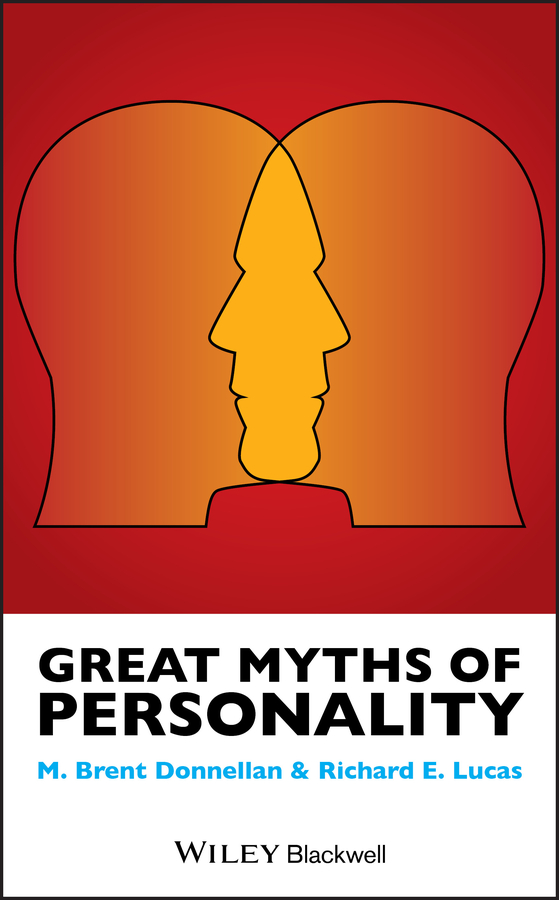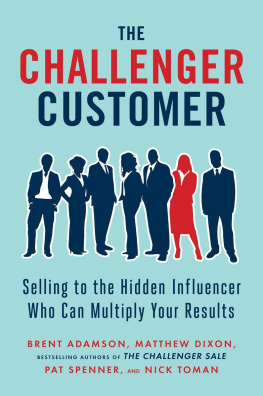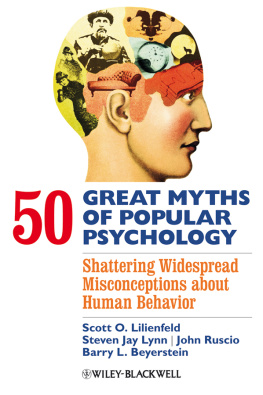M. Brent Donnellan - Great Myths of Personality
Here you can read online M. Brent Donnellan - Great Myths of Personality full text of the book (entire story) in english for free. Download pdf and epub, get meaning, cover and reviews about this ebook. year: 2020, genre: Romance novel. Description of the work, (preface) as well as reviews are available. Best literature library LitArk.com created for fans of good reading and offers a wide selection of genres:
Romance novel
Science fiction
Adventure
Detective
Science
History
Home and family
Prose
Art
Politics
Computer
Non-fiction
Religion
Business
Children
Humor
Choose a favorite category and find really read worthwhile books. Enjoy immersion in the world of imagination, feel the emotions of the characters or learn something new for yourself, make an fascinating discovery.

- Book:Great Myths of Personality
- Author:
- Genre:
- Year:2020
- Rating:3 / 5
- Favourites:Add to favourites
- Your mark:
- 60
- 1
- 2
- 3
- 4
- 5
Great Myths of Personality: summary, description and annotation
We offer to read an annotation, description, summary or preface (depends on what the author of the book "Great Myths of Personality" wrote himself). If you haven't found the necessary information about the book — write in the comments, we will try to find it.
Great Myths of Personality — read online for free the complete book (whole text) full work
Below is the text of the book, divided by pages. System saving the place of the last page read, allows you to conveniently read the book "Great Myths of Personality" online for free, without having to search again every time where you left off. Put a bookmark, and you can go to the page where you finished reading at any time.
Font size:
Interval:
Bookmark:

- Chapter 2
- Chapter 4
- Chapter 28
Series Editors
Scott O. Lilienfeld
Steven Jay Lynn
This superb series of books tackles a host of fascinating myths and misconceptions regarding specific domains of psychology, including child development, aging, marriage, brain science, and mental illness, among many others. Each book not only dispels multiple erroneous but widespread psychological beliefs but provides readers with accurate and uptodate scientific information to counter them. Written in engaging, upbeat, and userfriendly language, the books in the myths series are replete with scores of intriguing examples drawn from everyday psychology. As a result, readers will emerge from each book entertained and enlightened. These unique volumes will be invaluable additions to the bookshelves of educated laypersons interested in human nature, as well as of students, instructors, researchers, journalists, and mental health professionals of all stripes.
www.wiley.com/go/psychmyths
Published
50 Great Myths of Popular Psychology
Scott O. Lilienfeld, Steven Jay Lynn, John Ruscio, and Barry L. Beyerstein
Great Myths of Aging
Joan T. Erber and Lenore T. Szuchman
Great Myths of the Brain
Christian Jarrett
Great Myths of Child Development
Stephen Hupp and Jeremy D. Jewell
Great Myths of Adolescence
Jeremy D. Jewell, Michael Axelrod, Mitchell J. Prinstein, and Stephen Hupp
Great Myths of Intimate Relationships
Matthew D. Johnson
Great Myths of Education and Learning
Jeffrey D. Holmes
Great Myths of Personality
M. Brent Donnellan and Richard E. Lucas
Forthcoming
Great Myths of Autism
James D. Herbert
50 Great Myths of Popular Psychology, Second Edition
Scott O. Lilienfeld, Steven Jay Lynn, John Ruscio, and Barry L. Beyerstein
M. Brent Donnellan
Richard E. Lucas

This edition first published 2021
2021 John Wiley & Sons, Inc.
All rights reserved. No part of this publication may be reproduced, stored in a retrieval system, or transmitted, in any form or by any means, electronic, mechanical, photocopying, recording or otherwise, except as permitted by law. Advice on how to obtain permission to reuse material from this title is available at http://www.wiley.com/go/permissions.
The right of M. Brent Donnellan and Richard E. Lucas to be identified as the authors of this work has been asserted in accordance with law.
Registered Office
John Wiley & Sons, Inc., 111 River Street, Hoboken, NJ 07030, USA
Editorial Office
111 River Street, Hoboken, NJ 07030, USA
For details of our global editorial offices, customer services, and more information about Wiley products visit us at www.wiley.com.
Wiley also publishes its books in a variety of electronic formats and by printondemand. Some content that appears in standard print versions of this book may not be available in other formats.
Limit of Liability/Disclaimer of Warranty
While the publisher and authors have used their best efforts in preparing this work, they make no representations or warranties with respect to the accuracy or completeness of the contents of this work and specifically disclaim all warranties, including without limitation any implied warranties of merchantability or fitness for a particular purpose. No warranty may be created or extended by sales representatives, written sales materials or promotional statements for this work. The fact that an organization, website, or product is referred to in this work as a citation and/or potential source of further information does not mean that the publisher and authors endorse the information or services the organization, website, or product may provide or recommendations it may make. This work is sold with the understanding that the publisher is not engaged in rendering professional services. The advice and strategies contained herein may not be suitable for your situation. You should consult with a specialist where appropriate. Further, readers should be aware that websites listed in this work may have changed or disappeared between when this work was written and when it is read. Neither the publisher nor authors shall be liable for any loss of profit or any other commercial damages, including but not limited to special, incidental, consequential, or other damages.
Library of Congress CataloginginPublication Data
Names: Donnellan, M. Brent, author. | Lucas, Richard E. (Richard Eric), 1971 author.
Title: Great myths of personality / M. Brent Donnellan, Richard E. Lucas.
Description: Hoboken, NJ : WileyBlackwell, 2021. | Series: Great myths of psychology | Includes bibliographical references and index.
Identifiers: LCCN 2020037204 (print) | LCCN 2020037205 (ebook) | ISBN 9781118521397 (cloth) | ISBN 9781118521359 (paperback) | ISBN 9781118521441 (adobe pdf) | ISBN 9781118521410 (epub)
Subjects: LCSH: Personality.
Classification: LCC BF698 .D645 2021 (print) | LCC BF698 (ebook) | DDC 155.2dc23
LC record available at https://lccn.loc.gov/2020037204
LC ebook record available at https://lccn.loc.gov/2020037205
Cover Design: Wiley
Cover Image: JakeOlimb/Getty Images
People are different from one another. Some are cautious, whereas others are brave. Some are energetic and sociable, whereas others are withdrawn and shy. Some have high levels of selfcontrol, whereas others are impulsive and rash. No two people are exactly alike, and this diversity is one of the more interesting aspects of human nature. Appreciating and understanding these differences is at the heart of personality psychology. Although personality psychology is also concerned with the common core of human nature that makes people similar to one another, the subfield is most often identified with individual differences in thoughts, feelings, and behaviors. More specifically, personality psychology seeks to understand at least four broad issues:
- How are people different from each other? Research addressing this question seeks to determine the basic dimensions of personality and levels of individuality. Research in this stream also concerns personality assessment and evaluates different ways to measure personality (e.g., selfreport surveys vs. reports from knowledgeable informants vs. behavioral tasks).
- Why are people different from each other? Research addressing this question evaluates genetic and environmental contributions to personality and increasingly seeks to understand how biological factors and life experiences work together to shape personality. Work in this area also evaluates how brain systems, hormones, and specific genes are related to personality.
- How and why does personality develop across the life span? Research addressing this question seeks to chart the course of psychological development from infancy to old age. Research in this strand of personality psychology addresses classic questions related to stability and change in personality and what processes account for stability and change.
- Do individual differences matter for consequential life outcome (such as health, wealth, and mortality)? Research addressing this question is ultimately about the importance of personality for everyday life, such as relationship functioning, wellbeing, physical health, and workrelated outcomes. It would be hard to imagine how research on the other three questions would matter if personality attributes themselves did not predict realworld outcomes. Personality would turn out to be a pretty esoteric and irrelevant topic if it did not relate to basic functioning in important life domains.
Font size:
Interval:
Bookmark:
Similar books «Great Myths of Personality»
Look at similar books to Great Myths of Personality. We have selected literature similar in name and meaning in the hope of providing readers with more options to find new, interesting, not yet read works.
Discussion, reviews of the book Great Myths of Personality and just readers' own opinions. Leave your comments, write what you think about the work, its meaning or the main characters. Specify what exactly you liked and what you didn't like, and why you think so.










